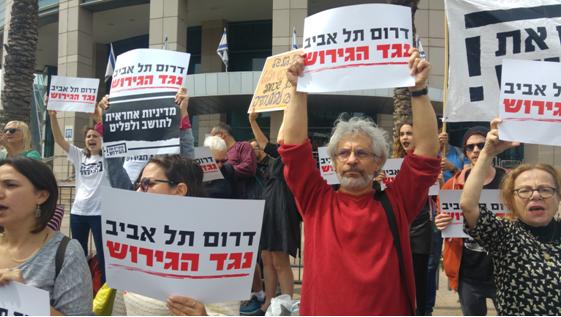Protests have resumed following Prime Minister Benjamin Netanyahu’s sudden announcement that he is suspending a plan to resolve the African refugee question. On Tuesday morning, April 3, three rallies were held against the racist policy of the Israeli government in front of the Interior Ministry in Tel Aviv, near the Prime Minister’s Office in Jerusalem, and outside the Haifa home of the Minister of Finance, Moshe Kahlon. Among the protesters were a number of activists from Hadash and the Communist Party of Israel.
The Israeli government announced Monday, April 2, that following mutual understandings it had reached with the UN Refugee Agency, it was abandoning its plan to deport tens of thousands of African asylum seekers to Rwanda. Under the agreement, UNHCR will work to resettle 16,250 African asylum seekers in Western countries and Israel will give legal status to a portion of the remaining African asylum seeker population in Israel.

Rally against the racist policy of the Israeli government in front of the Ministry of Interior in Tel Aviv, Tuesday morning, April 3 (Photo: Zu Haderech weekly)
After the announcement, Joint List Chairman MK Ayman Odeh (Hadash) said he is “happy for the African refugees and the residents of south Tel Aviv, and I praise those who fought with them, shoulder to shoulder. We proved that in a instant those who were previously called a cancer in our body” (a turn of phrase coined by Culture Minister Miri Regev, for which she later apologized) “can be transformed into immigrants with rights.” MK Odeh connected the African refuge-seekers to Palestinians oppression, adding: “Now, with the same determination and solidarity between weakened groups, we can defeat the occupation.”
However, late Monday night, Netanyahu announced that, due to pressure from his far-right coalition — which was angered that the PM would agree to settle any African asylum seekers in Israel — he is suspending the UN plan. Whether the resettlement plan is ultimately re-instituted or not, Netanyahu’s admission that it is no longer viable to deport asylum seekers to Rwanda remains a fact. In addition, while the fate of tens of thousands of Eritrean and Sudanese asylum seekers is once again in limbo, hopefully they can sleep a little bit sounder tonight knowing that forcible deportation to Rwanda is off the table.
Last week The Hotline for Refugees and Migrants (HRM) published new report on detention facilities for refugees. HRM is the only organization in Israel allowed entry into four detention facilities for asylum seekers – Holot, Saharonim, Givon, and Yahalom.
Currently, the majority of those held in detention facilities are asylum seekers from Eritrea and Sudan that the Israeli government is not deportng to their home country. Others are migrant workers or tourists whose visas expired or who violated the terms of their visa. According the UNHCR’s instructions, “detention is an exceptional measure and can only be justified for a legitimate purpose.”
Shirley Racah, Executive Director of the Hotline for Refugees and Migrants, said: “For years now Israel has been arresting people as an alternative to a proper immigration policy and refuses to grant status to those who deserve it, or to allow alternatives to detention to those who are destined for deportation. We are standing at the cusp of an era in which asylum seekers will be imprisoned while innocent of any crime, and now more than ever it’s important to again emphasize that detention does not constitute an immigration policy.”


